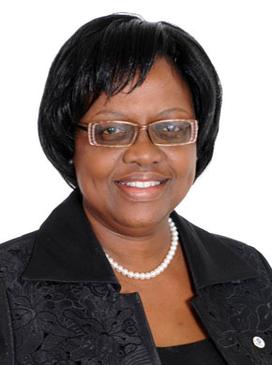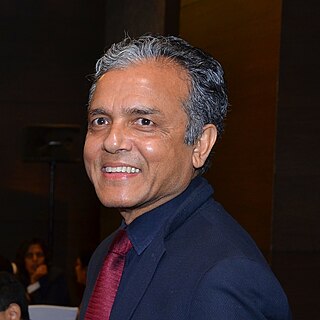Related Research Articles
The very high rate of human immunodeficiency virus infection experienced in Uganda during the 1980s and early 1990s created an urgent need for people to know their HIV status. The only option available to them was offered by the National Blood Transfusion Service, which carries out routine HIV tests on all the blood that is donated for transfusion purposes. The great need for testing and counseling resulted in a group of local non-governmental organizations such as The AIDS Support Organisation, Uganda Red Cross, Nsambya Home Care, the National Blood Bank, the Uganda Virus Research Institute together with the Ministry of Health establishing the AIDS Information Centre in 1990. This organization worked to provide HIV testing and counseling services with the knowledge and consent of the client involved.
Economic epidemiology is a field at the intersection of epidemiology and economics. Its premise is to incorporate incentives for healthy behavior and their attendant behavioral responses into an epidemiological context to better understand how diseases are transmitted. This framework should help improve policy responses to epidemic diseases by giving policymakers and health-care providers clear tools for thinking about how certain actions can influence the spread of disease transmission.
The Makerere University School of Medicine (MUSM), also known as the Makerere University Medical School, is the school of medicine of Makerere University, Uganda's oldest and largest public university. The medical school has been part of Makerere University since 1924. The school provides medical education at diploma, undergraduate, and postgraduate levels.
Makerere University School of Public Health (MUSPH) is one of the schools that comprise the Makerere University College of Health Sciences, a constituent college of Makerere University, Uganda's oldest and largest public university.
Nelson Kawulukusi Sewankambo, MBChB, MMed, MSc, FRCP, LLD (Hon), sometimes spelled as Nelson Ssewankambo, is a Ugandan physician, academician, medical researcher, and medical administrator. He is a professor of medicine and former principal of the Makerere University College of Health Sciences, a semi-autonomous constituent college of Makerere University.
David M. Serwadda is a Ugandan physician, medical researcher, academic, public health specialist and medical administrator. Currently he is a Professor of Public Health at Makerere University School of Public Health, one of the schools of Makerere University College of Health Sciences, a semi-autonomous constituent college of Makerere University, the oldest university in Uganda. Serwadda is also a founding member of Accordia Global Health Foundation's Academic Alliance.
Circumcision surgical procedure in males involves either a conventional "cut and stitch" surgical procedure or use of a circumcision instrument or device. In the newborn period, almost all circumcisions are done by generalist physicians using one of three surgical instruments. In the US, the Gomco clamp is the most utilized instrument, followed by the Mogen clamp and the Plastibell. They are also used worldwide.
The Infectious Diseases Institute (IDI), established within Makerere University, is a Ugandan not-for-profit organization which aims to strengthen health systems in Africa, with a strong emphasis on infectious diseases; through research and capacity development. In pursuit of its mission both in Uganda and Sub-Saharan Africa, IDI provides care to People Living with HIV (PLHIV) and other infectious diseases, builds capacity among healthcare workers through training and ongoing support, maintains a focus on prevention, and carries out relevant research.
Harriet Mayanja-Kizza, MBChB, MMed, MSc, FACP, is a Ugandan physician, researcher, and academic administrator. She is the former Dean of Makerere University School of Medicine, the oldest medical school in East Africa, established in 1924.

Margaret Mungherera was a senior consultant psychiatrist and medical administrator in Uganda. She served as the president of the Uganda Medical Association re-elected five times and ultimately the World Medical Association from October 2013 until October 2014. She advocated for psychiatric services throughout Uganda, beyond the capital, to improve conditions for Uganda's health-care providers and to get doctors organized in African countries in general.
Moses R Kamya, is a Ugandan physician, academic, researcher and academic administrator, who serves as Professor and Chair of the Department Medicine, Makerere University School of Medicine, a component of Makerere University College of Health Sciences.
Rhoda Wanyenze is a physician, public health consultant, academic and medical administrator, who serves as the Dean of Makerere University School of Public Health, a component school of Makerere University College of Health Sciences, which is part of Makerere University, Uganda's oldest and largest public university.
Mads Melbye is director of the Cancer Institute in Denmark (DCRC). He earned his M.D. degree from University of Aarhus, Denmark, in 1983, and a DMSc degree from the same university in 1988. His thesis work was partly done as a fellow in the epidemiology program (1985–1986) at the National Cancer Institute, NIH, US. After clinical training he became senior investigator in 1989 at the Danish Cancer Registry in Copenhagen, and in 1991 state epidemiologist at Statens Serum Institut (SSI) in Copenhagen. In 1992, Melbye was given a personal chair in infectious disease and cancer epidemiology by the Danish minister for research and education. He founded the Department of Epidemiology Research at SSI and to day this department is one of Europe's largest epidemiology research milieus. From 1998 to 2008 he was foreign adjunct professor at Medical Epidemiology and Biostatistics Branch at Karolinska University in Stockholm. In 2012 he established the Danish National Biobank, which is one of the biggest biobanks in the world today. Same year he became senior vice-president at Statens Serum Institut in Copenhagen and from 2016 till 2020 president and CEO. He is presently professor of medical epidemiology at University of Copenhagen and affiliated with Department of Genetics at Stanford University School of Medicine.

Swarup Sarkar is an Indian epidemiologist, public health professional and diplomat known for his work in the field of Infectious Diseases and HIV/AIDS in particular.
Roy D. Mugerwa was a Ugandan physician, cardiologist and researcher. His contribution to the world of academics include being a Professor Emeritus at Makerere University College of Health Sciences in Kampala, cardiology in Uganda, researching HIV/AIDS and tuberculosis, and his efforts to find an effective HIV vaccine.
Fred Nalugoda is a public health researcher studying HIV/AIDS in rural Uganda for over 20 years, mainly through surveillance and field work. He currently serves as the Program Director of a research station in Kalisizo in Uganda as part of his continued work at the Rakai Health Sciences Program (RHSP).
Joseph Konde-Lule is a retired Ugandan medical sociologist and epidemiologist who conducted extensive work regarding HIV risk behaviors in rural Uganda.
Damalie Nakanjako, is a Ugandan specialist physician, internist, immunologist, infectious diseases consultant, academic and researcher, who serves as the Principal and Professor of Medicine at Makerere University College of Health Sciences. Immediately prior to her present position, she served as Dean of Makerere University School of Medicine, from 2019 until 17 February 2021.
Violence against women in Uganda is an issue that negatively affects various aspects of women's lives. COVID-19 has worsened the current condition for women facing domestic violence. Perceived changing social standards and cultural norms indicate power dynamics which is a primary cause of violence carried out against women. Refugee women in Uganda are uniquely subjugated as they have the least access to gaining social or monetary capital. However, there has been recent legislation aimed at improving the quality of life for Ugandan women and refugee women in Uganda.
References
- ↑ "Accordia's Academic Alliance - Ugandan Chapter". Accordia Global Health Foundation. 2009. Archived from the original on 26 December 2014. Retrieved 7 December 2014.
- ↑ "Fred Wabwire-Mangen: Head of Department of Epidemiology, Makerere University". Africa-America Institute. 18 June 2013. Retrieved 7 December 2014.
- ↑ "Professor Fred Wabwire - Research Interests And Accomplishments". USAMRUK Department of Emerging Diseases. 2011. Retrieved 7 December 2014.
- ↑ "UNAS: Fellow Profile". Uganda National Academy of Science. Archived from the original on 2 March 2015. Retrieved 27 December 2014.
- ↑ Yeka, Adoke; Gasasira, Anne; Mpimbaza, Arthur; Achan, Jane; Nankabirwa, Joaniter; Nsobya, Sam; Staedke, Sarah G.; Donnelly, Martin J.; Wabwire-Mangen, Fred; Talisuna, Ambrose; Dorsey, Grant; Kamya, Moses R.; Rosenthal, Philip J. (2012-03-01). "Malaria in Uganda: Challenges to control on the long road to elimination: I. Epidemiology and current control efforts". Acta Tropica. Tackling The Malaria "End Game": Regional Needs And Challenges For Successful Malaria Elimination. 121 (3): 184–195. doi:10.1016/j.actatropica.2011.03.004. ISSN 0001-706X. PMC 3156969 . PMID 21420377.
- ↑ Gray, Ronald H; Kigozi, Godfrey; Serwadda, David; Makumbi, Frederick; Watya, Stephen; Nalugoda, Fred; Kiwanuka, Noah; Moulton, Lawrence H; Chaudhary, Mohammad A; Chen, Michael Z; Sewankambo, Nelson K; Wabwire-Mangen, Fred; Bacon, Melanie C; Williams, Carolyn FM; Opendi, Pius (2007-02-24). "Male circumcision for HIV prevention in men in Rakai, Uganda: a randomised trial". The Lancet. 369 (9562): 657–666. doi:10.1016/S0140-6736(07)60313-4. ISSN 0140-6736. PMID 17321311. S2CID 15958720.
- ↑ Quinn, Thomas C.; Wawer, Maria J.; Sewankambo, Nelson; Serwadda, David; Li, Chuanjun; Wabwire-Mangen, Fred; Meehan, Mary O.; Lutalo, Thomas; Gray, Ronald H. (2000-03-30). "Viral Load and Heterosexual Transmission of Human Immunodeficiency Virus Type 1". New England Journal of Medicine. 342 (13): 921–929. doi: 10.1056/NEJM200003303421303 . ISSN 0028-4793. PMID 10738050.
- ↑ Wawer, Maria J. (2005). "Rates of HIV-1 Transmission per Coital Act, by Stage of HIV-1 Infection, in Rakai, Uganda". The Journal of Infectious Diseases. 191 (9): 1403–1409. doi: 10.1086/429411 . PMID 15809897. S2CID 5871691.
- ↑ Gray, Ronald H.; Wawer, Maria J.; Brookmeyer, Ron; Sewankambo, Nelson K.; Serwadda, David; Wabwire-Mangen, Fred; Lutalo, Tom; Li, Xianbin; vanCott, Thomas; Quinn, Thomas C. (2001-04-14). "Probability of HIV-1 transmission per coital act in monogamous, heterosexual, HIV-1-discordant couples in Rakai, Uganda". The Lancet. 357 (9263): 1149–1153. doi:10.1016/S0140-6736(00)04331-2. ISSN 0140-6736. PMID 11323041. S2CID 16092714.
- ↑ Wawer, Maria J.; Sewankambo, Nelson K.; Serwadda, David; Quinn, Thomas C.; Kiwanuka, Noah; Li, Chuanjun; Lutalo, Thomas; Nalugoda, Fred; Gaydos, Charlotte A.; Moulton, Lawrence H.; Ahmed, Saifuddin; Gray, Ronald H.; Paxton, Lynn A.; Wabwire-Mangen, Fred; Meehan, Mary O. (1999-02-13). "Control of sexually transmitted diseases for AIDS prevention in Uganda: a randomised community trial". The Lancet. 353 (9152): 525–535. doi: 10.1016/S0140-6736(98)06439-3 . ISSN 0140-6736. PMID 10028980. S2CID 18017317.
- ↑ Nachega, Jean B (2012). "Current status and future prospects of epidemiology and public health training and research in the WHO African region". International Journal of Epidemiology. 41 (6): 1829–1846. doi:10.1093/ije/dys189. PMC 3535755 . PMID 23283719 . Retrieved 2023-02-02.
- ↑ Sewankambo, Nelson; Gray, Ronald H; Wawer, Maria J; Paxton, Lynn; McNairn, Denise; Wabwire-Mangen, Fred; Serwadda, David; Li, Chuanjun; Kiwanuka, Noah; Hillier, Sharon L; Rabe, Lorna; Gaydos, Charlotte A; Quinn, Thomas C; Konde-Lule, Joseph (1997-08-23). "HIV-1 infection associated with abnormal vaginal flora morphology and bacterial vaginosis". The Lancet. 350 (9077): 546–550. doi: 10.1016/S0140-6736(97)01063-5 . ISSN 0140-6736. PMID 9284776. S2CID 39406465.
- ↑ Gray, Ronald H; Li, Xianbin; Kigozi, Godfrey; Serwadda, David; Brahmbhatt, Heena; Wabwire-Mangen, Fred; Nalugoda, Fred; Kiddugavu, Mohamed; Sewankambo, Nelson; Quinn, Thomas C; Reynolds, Steven J; Wawer, Maria J (2005-10-01). "Increased risk of incident HIV during pregnancy in Rakai, Uganda: a prospective study". The Lancet. 366 (9492): 1182–1188. doi:10.1016/S0140-6736(05)67481-8. ISSN 0140-6736. PMID 16198767. S2CID 12563523.
- ↑ Gray, Ronald H; Wawer, Maria J; Serwadda, David; Sewankambo, Nelson; Li, Chuanjun; Wabwire-Mangen, Frederick; Paxton, Lynn; Kiwanuka, Noah; Kigozi, Godfrey; Konde-Lule, Joseph; Quinn, Thomas C; Gaydos, Charlotte A; McNairn, Denise (1998-01-10). "Population-based study of fertility in women with HIV-1 infection in Uganda". The Lancet. 351 (9096): 98–103. doi: 10.1016/S0140-6736(97)09381-1 . ISSN 0140-6736. PMID 9439494. S2CID 19552389.
- ↑ Gray, Ronald H.; Kigozi, Godfrey; Serwadda, David; Makumbi, Frederick; Nalugoda, Fred; Watya, Stephen; Moulton, Laurence; Chen, Michael Z.; Sewankambo, Nelson K.; Kiwanuka, Noah; Sempijja, Victor; Lutalo, Tom; Kagayii, Joseph; Wabwire-Mangen, Fred; Ridzon, Renée (2009-01-01). "The effects of male circumcision on female partners' genital tract symptoms and vaginal infections in a randomized trial in Rakai, Uganda". American Journal of Obstetrics and Gynecology. 200 (1): 42.e1–42.e7. doi:10.1016/j.ajog.2008.07.069. ISSN 0002-9378. PMC 2727852 . PMID 18976733.